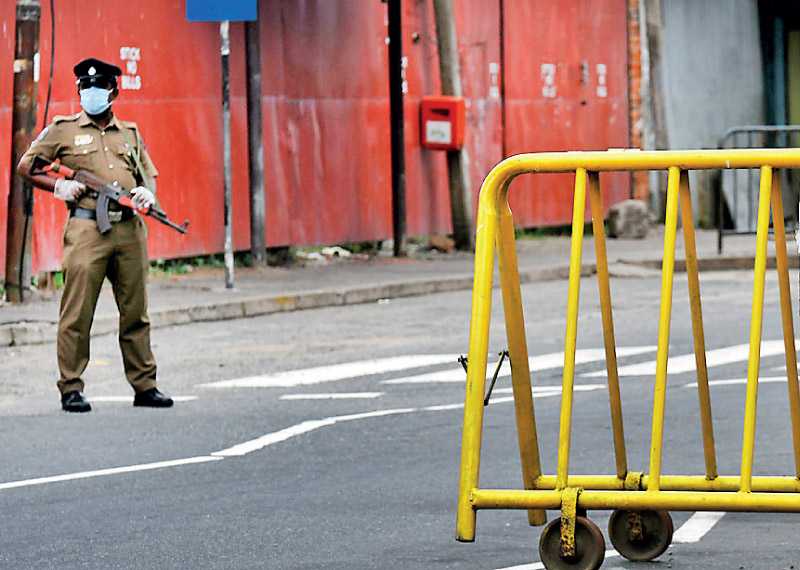Wednesday Feb 25, 2026
Wednesday Feb 25, 2026
Thursday, 13 May 2021 01:15 - - {{hitsCtrl.values.hits}}

Movement restrictions were imposed by the Government yesterday to stem the rapid spread of the third COVID-19 wave
By Shailendree Wickrama Adittiya
As COVID-19 numbers continued to climb the Government yesterday initiated movement restrictions on all non-essential travel across the island from 11 p.m. today to 4 a.m. on Monday, after which movement restriction will be in place at the same time daily until 31 May.
The multiple announcements that came in quick succession caused much public confusion before they were gradually clarified as the day wore on. In addition to essential services, persons requiring medical attention will be permitted to travel to the hospitals closest to them while restrictions are in place.
However, to contain the spread of COVID-19, authorities have decided to limit movement further when restrictions are eased. This does not apply to essential services and persons reporting to work. As such, persons will be permitted to leave their homes only on specific days, based on the last digit of their NIC. Those with an odd number as their last digit can leave the house on odd days and those with an even number can leave the house on even days.
For instance, persons with 1, 3, 5, 7 or 9 as the last digit of their NIC number can leave the house on 17 May and persons with 0, 2, 4, 6 or 8 as the last digit can leave the house on 18 May.
While Sri Lankan residents are required to use their NIC, foreigners can use a passport or driver’s licence.
Inter-provincial travel restrictions will also be in place until the end of the month with Police Spokesperson DIG Ajith Rohana confirming that close to 30 individuals were arrested yesterday for using byroads to cross provincial boundaries.
“A vaccination program is currently being carried out in the Western Province. Persons notified of such can travel to the closest centre to them. The present movement restrictions will not apply to such persons,” he added.
The Director General of Health Services has also issued guidelines in relation to 48 institutions and activities. Public transport will only be permitted to carry passengers to meet the seating capacity. In hired transport, like cars or three-wheelers, a maximum of two passengers will be allowed.
Utility services, as well as private and public offices, are required to operate with minimum staff and allow employees to work from home as much as possible. Export-oriented industries will be permitted to operate within a bio-bubble.
Any corporate meetings to discuss COVID-19 guidelines have a participant limit of 10 persons; any other meetings must be held virtually. Workshops and conferences will not be permitted.
Weddings will not be permitted but marriage registrations will be permitted with a maximum of 15 attendees, including the marriage registrar and witnesses.
Funerals will be permitted with a maximum of 15 persons. The funeral must take place within 24 hours of the death. Special guidelines apply to COVID-19 deaths.
Restaurants can function at 25% capacity and delivery services can be carried out with adherence to DREAM (distancing, respiratory etiquette, aseptic practices, and the proper use of a face mask) protocol.
Pubs, bars, casinos, community centres, betting centres, and massage parlours will remain closed, as will gyms, indoor halls, cinemas, parks and pools.
Liquor stores will be permitted to operate between 10 a.m. and 6 p.m.
Visitation at prisons will not be permitted while courts will function at 25% capacity. The 25% capacity limit also applies to bakeries, street vendors, salons and beauticians.
Supermarkets will be permitted to operate at 25% capacity, allocating 1.5 square metres per customer. Malls, financial institutions, banks, clothing stores, retail stores and open markets must also operate within the limitation of 1.5 square metres per customer.
Mobile vendors, fuel stations, construction sites, and State and private hospitals can operate while adhering to safety guidelines.
The agriculture sector can operate with adherence to DREAM protocol.
Hostels can operate with adherence to DREAM but cannot accept new lodgers. Hotels and guest houses can operate at 25% capacity.
Day-care centres, preschools, schools, universities and tuition classes will remain closed, and gatherings, festivals and parties will not be permitted. Group activities in places of worship will also not be permitted.
